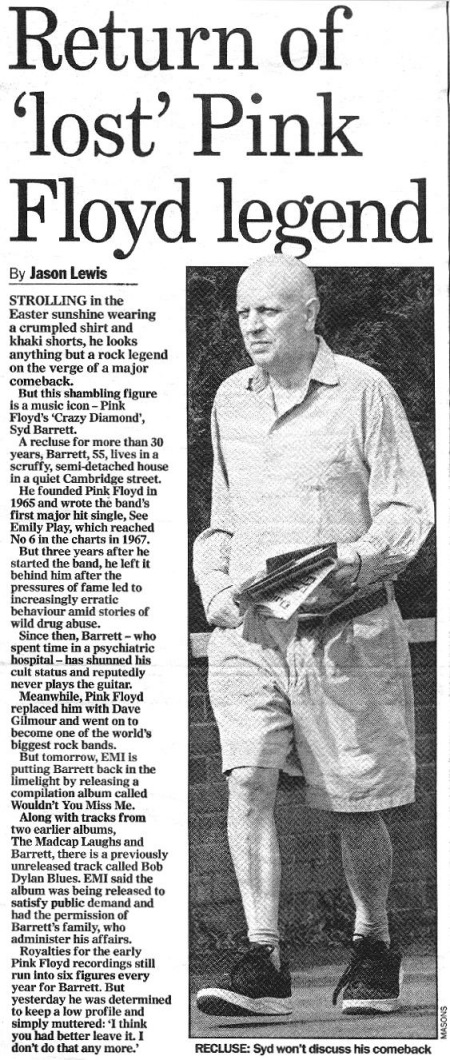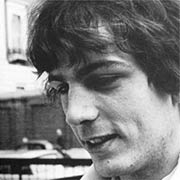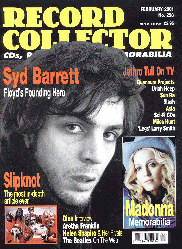|
Here
is a press release from EMI in the UK:
SYD BARRETT
'Wouldn't You Miss Me? The Best Of...'
Release Date: April 16th 2001
Catalogue No.: 532 3202
For the first time in the
UK, Harvest release a 'best of' Syd
Barrett compilation.
Titled 'Wouldn't You Miss
Me? The Best Of', this 22 track CD
contains a selection of
Syd's 'best' work culled from his two
studio albums, 'Madcap
Laughs' and 'Barrett' and the rarities
album, 'Opel', together
with the previously unreleased and much
sought after, 'Bob Dylan
Blues' (an outtake from 1969, which has
made its appearance due
to Syd's longtime friend and fellow Pink
Floyd member, Dave
Gilmour giving EMI permission to use the
track). Also included is
a BBC session track, 'Two Of A Kind'.
Syd Barrett's music has
influenced many artists - this
compilation not only
serves as an excellent reminder of a genius
at work, but makes the
perfect sampler for a whole new
generation wishing to
hear who it was that influenced some of
their favourite bands,
and of course a chance for fans to hear
the unreleased track for
the first time - a pure gem!
Track
Listing
Octopus
Late Night
Terrapin
Swan Lee
Wolf Pack
Golden Hair
Here I Go
Long Gone
No Good Trying
Opel
Baby Lemonade
Gigolo Aunt
Dominoes
Wouldn't You Miss Me
Wined And Dined
Effervescing Elephant
Waving My Arms In The Air
I
Never Lied To You
Love Song
Two OF A Kind (BBC Session Track)
Bob Dylan Blues (Previously Unreleased)
Golden Hair (instrumental)
SLEEVE NOTES
BY MARK PAYTRESS
There are magnificent
cult heroes shrouded in the stuff of
infamy and legend ... and
then there is Syd Barrett. Syd the
unforgotten hero of the
early Pink Floyd, who virtually set the
parameters for British
psychedelia with his fanciful songs and
space-age improvisation.
The summer of love's prize bloom who
soon wilted under the
gaze of the pop world's plastic eye. The
sacrificial lamb of the
love generation's wilder excesses who
simply forgot to sing or
play his guitar. The self-styled'
Vegetable Man' who
re-emerged with two solo albums that bore the
scars of hippie innocence
and the acid experience with a
shocking
nselfconsciousness (sic). It's the best of these two
remarkable records - and
out-takes recorded during the sessions
- that are now available
on "Wouldn't You Miss Me", the first
ever Syd Barrett
compilation.
Syd's genius, and its
subsequent fragmentation, seems a dream
and a nightmare away from
a potentially idyllic upbringing as a
middle class son of one
of Britain's most prestigious and
cultured cities. As a
Cambridge child, Barrett (born Roger Keith
Barrett on 6 January
1946) listened attentively to stories read
by his mother Winifred,
tales that instilled in him a thirst for
escape and invention, an
otherworld he continued to inhabit as
an a student at
Camberwell Art School during the mid-60s.
Inevitably, music too,
inspired him, typically The Beatles, Bob
Dylan and - most of all -
the gritty, hostile sounds of R&B
epitomised by The Rolling
Stones. Another, more general
influence was the
emerging post-Beat subculture, which aspired
to a new way of life
where poetry, art, literature, music and
recreational drug use
provided an antidote to artless suburban
convention. This provided
the perfect environment in which the
ever-imaginative Barrett
could flourish.
It was Syd's peculiarly
acute imagination that transformed the
early Pink Floyd from a
promising R&B group with lofty ambitions
into the UK's premier
acid-rock combo. Barrett's fragmented,
glissando guitar-playing
added an otherworldly gloss to the
band's extended jams,
while his shorter songs conjured up a
magical, idyllic backdrop
to flower-power's technicolor dreams.
In 1967, when half of the
western world appeared to turn on,
tune in and at least
fantasise about dropping out, these were
indeed admirable
qualities.
After the debut 45,
"Arnold Layne", scraped into the charts, the
the (sic) impeccable
psych-pop follow-up, "See Emily Play", took
the band into the Top 5,
onto 'Top Of The Pops' and around the
country's ballroom
circuit. By August 1967, and with the band's
debut album, "The
Piper At The Gates Of Dawn", poised for
release, The Pink Floyd
were on the cusp of a real breakthrough.
Unfortunately, it was the
moment when Syd decided to absent
himself for a few days;
worse still, he returned a changed man.
Always erratic, now his
behaviour seriously undermined the
group's future. His
ability to translate his raw songwriting
into finished studio
creations left him; on stage, he often
stood motionless
contributing nothing more than provoking looks
of bewilderment on the
faces of his colleagues. After a second
guitarist, Syd's old
Cambridge buddy Dave Gilmour, was added to
the line-up, Barrett
became virtually dispensable to the band.
On 26 January 1968, the
group that had once relied so much on
his contributions, set
off for a concert without him.
Despite this apparent
humiliation (though Barrett already seemed
past caring), all was not
lost. Pink Floyd's co-managers Andrew
King and Peter Jenner
chose to dissolve their relationship with
the band, and Jenner -
who once described Syd as "the most
creative person I'd ever
known" - became Barrett's manager and
producer. But while the
Floyd steadily rebuilt their career
through constant gigging
and an infinitesimal attention to
detail in the recording
studio, Syd became more difficult than
ever. Recording sessions
for his first solo album, "The Madcap
Laughs", began in
May 1968 and continued intermittently until
October 1969, overseen by
a number of increasingly exasperated
producers and engineers.
"Initially, these
were booked as demo sessions just to see if
Syd had any songs worth
recording," recalls Peter Mew, who
engineered several of the
tracks on the first record. "it was
all a bit chaotic - do a
bit, then go off and have a smoke - and
Syd wasn't totally compos
mentis. He wasn't temperamental, just
not on the same planet as
the rest of us. A lot of the songs had
potential and you
thought, "if the guy pulls himself together,
you've got something
here." After stints with Jenner and EMI
staffer Malcolm Jones
handling production duties, the Floyd's
Dave Gilmour and Roger
Waters were drafted in to salvage
something from the
sessions.
Syd's work with Pink
Floyd had been ornate and sophisticated.
The arrangements on 'The
Madcap Laughs" - threadbare, slapdash
even - couldn't have been
more different. The effect was both
unsettling and inspiring,
for here was pitiable estrangement and
unharnessed imagination,
unrefined and nerve-tinglingly raw. On
"Feel", one of
the record's more despairing songs, Barrett
complains: "I want
to go home..." Early in 1970, around the time
of the album's release,
that's exactly what he did, leaving his
central London flat and
returning to the family home in
Cambridge, where he
famously took up residence in the cellar.
Between February and July
that year, he was tempted back to
London for intermittent
work on a second solo album, "Barrett",
a marginally more
conventional - though less inspired - affair
thanks to the involvement
again of Dave Gilmour. "Dave showed
incredible amounts of
patience," says Jerry Shirley, who played
drums on the sessions.
"We never knew what time Syd would start
or finish. He might not
even turn up at all. The only
predictable thing about
Syd at that point was that he was
totally unpredictable, as
nutty as a fruitcake."
On these solo records,
Syd's working methods took the
psychedelic model of
spontaneous creativity to the extreme. "The
one thing Syd could still
do was to write a decent, unusual
song," says Shirley.
"But even they got so unpredictable that
even he couldn't remember
them. If you didn't record a new song
right away, it would be
gone." After getting several of Syd's
new songs down on tape,
the musicians - who also included Floyd
keyboard player Rick
Wright and Gilmour himself - would overdub
the parts afterwards, no
mean feat given Syd's erratic sense of
timing. "He found it
extremely difficult to play as part of a
band by this time,"
maintains Jerry Shirley. "it was just all
over the place."
Despite this obvious limitation, Shirley and
Gilmour nevertheless
braved an appearance with Syd for a
comeback concert at the
Olympia, London, in June 1970. Four
songs into the set,
Barrett simply put his guitar down and
walked off. By the end of
the year, he'd returned to Cambridge
for good, largely
oblivious to the enormous cult that was
growing, and continues to
grow around him.
One of many latter-day
celebrity Barrett devotees is Blur
guitarist Graham Coxon,
who once donated a vast, Syd- inspired
sculpture to a charity
auction. "I think Syd made a decision,
although a very twisted
one, that a musician's lifestyle wasn't
for him," he says.
"I like to think of him being happy, painting
and going for strolls in
the park. I don't think he misses the
pop circus. I think he
overdosed on it and chose a more pastoral
existence." And the
reason why the Barrett milieu is so
enduring? "There is
a little bit of Syd in everyone," he
insists. "It's that
sensitivity and vulnerability."
|
Syd Barrett Song Unearthed
"Bob Dylan's Blues" might be an
uncharacteristically prosaic title from a man better known for his songs
about gnomes, octopuses and effervescing elephants. But as this newly
unearthed Syd Barrett song -- to be included on a new compilation, Wouldn't
You Miss Me (EMI), which is due for release in the U.K. on April 16th
-- suggests, Pink Floyd's original "Crazy Diamond" was far from
immune to the occasional mortal influence.
Barrett, the errant star of British psychedelia,
masterminded Pink Floyd's early success before a combination of a nervous
breakdown and a tendency to overindulge in the era's more potent
stimulants prompted his departure from the group early in 1968. Tales of
mammoth drug binges, erratic stage performances and baffling behavioral
traits inevitably earned Barrett the "acid casualty" epithet.
After two solo albums, The Madcap Laughs and Barrett, both
clearly the work of a wildly distracted man, he simply disappeared from
view, taking up residence in the cellar of his family home in Cambridge.
Turning his back on rock & roll, he returned to painting. Occasional
Syd sightings, each one depicting the acid rock pin-up as increasingly
bald and overweight, prompted inevitable rumors of renewed activity, but
aside from a disastrous studio session in 1974, he's maintained a strange,
intensely private silence. Since the death of his mother in the early
Nineties, Syd Barrett lives alone in Cambridge, suffers from diabetes and
is tended to by his sister.
The Barrett legend has also been maintained by
Pink Floyd themselves, most noticeably by Roger Waters, whose "Shine
On You Crazy Diamond" and The Wall were both inspired by his
ex-colleague's mental health problems. Now, it is guitarist Dave Gilmour,
Barrett's replacement in Pink Floyd and producer of his two solo LPs, who
provides the fillip. "Bob Dylan's Blues," a remarkable pastiche
unlike anything else in the Barrett canon, has been culled from Gilmour's
private collection and is being released with the blessing of Barrett's
family.
"We knew of the song's existence when we put
together [1993's] Crazy Diamond box set," says project co-ordinator
Tim Chacksfield, "but we had plenty of other material so there was no
pressure for us to find it." The new compilation provided an ideal
opportunity to approach Gilmour and request permission to use the song.
But why the guitarist took the master tape with him after the February 27,
1970 demo session had been completed remains a mystery. David Parker,
author of Random Precision -- Recording the Music of Syd Barrett
1965-1974, maintains that Gilmour has always rated the song highly.
Chacksfield tends to agree: "The fact that Dave was happy to let it
out says a lot."
Although R&B, improvised music and nursery
rhyme-like folksong clearly influenced Barrett, the Dylan connection is
far more obscure. Barrett and Gilmour -- at the time mere Cambridge-based
teenage beat buffs -- did catch the visiting American at an early show in
London in 1963, and it's likely that "Bob Dylan's Blues" was
written during the following months. Peter Barnes, Pink Floyd's music
publisher, maintains, "It's one of Syd's very earliest songs written
before he even had a publishing deal."
The 1970 recording, with Barrett accompanying
himself on acoustic guitar, is a neat take on Dylan's early, talking blues
style. While finger-picking with typical, Dylan-like imprecision, Barrett
gently lampoons Dylan's activism and instead plays up the singer's
infamous nonchalance: "Got the Bob Dylan blues/And the Bob Dylan
shoes/And my clothes and my hair's in a mess/But you know/I just couldn't
care less." The chorus is equally even-handed: "Cos I'm a poet/Doncha
know it/And the wind, you can blow it/Cos I'm Mr. Dylan, the King/And I'm
free as a bird on the wing."
Though he later adopted Dylan's unkempt curly-top
hairstyle, this is the first aural evidence of Syd Barrett's early
enthusiasm for Dylan and provides an amusing aside to his more
brain-teasing material.
MARK PAYTRESS
(February 14, 2001)
Thanks to Rolling Stone for the Article. |
|
And
here is some info on a new book.
Random
Precision
Recording the Music of Syd Barrett 1965-1974'.
Author: David Parker
Syd Barrett was the original lead guitarist and a founder
member of the group Pink Floyd, and remains one of rock music's most
enduring characters. He was the principle songwriter for the first Pink
Floyd album 'The Piper at the Gates of Dawn', and composed their 1967 hit
single 'See Emily Play' before leaving the group in early 1968. He
subsequently released two eccentric solo albums ('The Madcap Laughs' in
1969 and 'Barrett' in 1970) before withdrawing completely from the music
business in the mid-1970's.
 Much
has been written about his life, but here for the first time are the full
details of all of his recording sessions - from his first
semi-professional recordings with Pink Floyd in 1965 up to his last
abandoned solo recording sessions at Abbey Road in 1974. Much
has been written about his life, but here for the first time are the full
details of all of his recording sessions - from his first
semi-professional recordings with Pink Floyd in 1965 up to his last
abandoned solo recording sessions at Abbey Road in 1974.
The author David Parker was co-editor of
the respected Syd Barrett fanzine 'Chapter 24', and has spent four years
researching and writing the book, which is based principally on
information obtained from the official archives at EMI Records and Abbey
Road Studios.
The book uses a diary format, and
includes exclusive interviews with many of the recording producers and
engineers involved, including Peter Jenner, Andrew King, Peter Bown, Alan
Parsons and John Leckie. The book also includes rare photographs and
illustrations, many previously unpublished.
This is the most comprehensive, accurate
and detailed account yet published of the background to the creation of
Syd Barrett's unique musical legacy.
Release Date: April 2001
Price: £14.99
|



